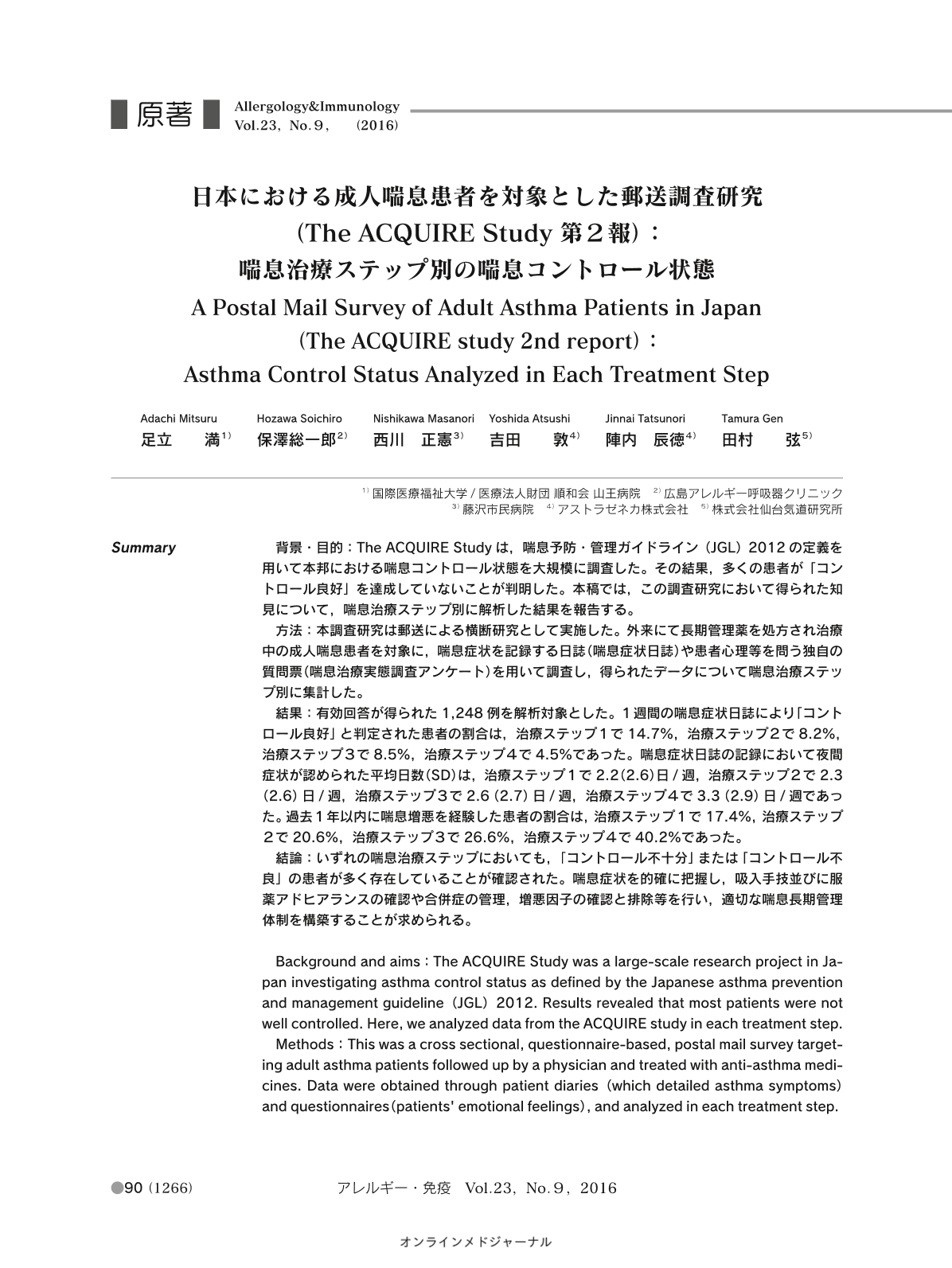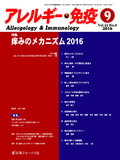Japanese
English
- 有料閲覧
- Abstract 文献概要
- 1ページ目 Look Inside
- 参考文献 Reference
- サイト内被引用 Cited by
背景・目的:The ACQUIRE Studyは,喘息予防・管理ガイドライン(JGL)2012の定義を用いて本邦における喘息コントロール状態を大規模に調査した。その結果,多くの患者が「コントロール良好」を達成していないことが判明した。本稿では,この調査研究において得られた知見について,喘息治療ステップ別に解析した結果を報告する。 方法:本調査研究は郵送による横断研究として実施した。外来にて長期管理薬を処方され治療中の成人喘息患者を対象に,喘息症状を記録する日誌(喘息症状日誌)や患者心理等を問う独自の質問票(喘息治療実態調査アンケート)を用いて調査し,得られたデータについて喘息治療ステップ別に集計した。 結果:有効回答が得られた1,248例を解析対象とした。1週間の喘息症状日誌により「コントロール良好」と判定された患者の割合は,治療ステップ1で14.7%,治療ステップ2で8.2%,治療ステップ3で8.5%,治療ステップ4で4.5%であった。喘息症状日誌の記録において夜間症状が認められた平均日数(SD)は,治療ステップ1で2.2(2.6)日/週,治療ステップ2で2.3(2.6)日/週,治療ステップ3で2.6(2.7)日/週,治療ステップ4で3.3(2.9)日/週であった。過去1年以内に喘息増悪を経験した患者の割合は,治療ステップ1で17.4%,治療ステップ2で20.6%,治療ステップ3で26.6%,治療ステップ4で40.2%であった。 結論:いずれの喘息治療ステップにおいても,「コントロール不十分」または「コントロール不良」の患者が多く存在していることが確認された。喘息症状を的確に把握し,吸入手技並びに服薬アドヒアランスの確認や合併症の管理,増悪因子の確認と排除等を行い,適切な喘息長期管理体制を構築することが求められる。
Background and aims:The ACQUIRE Study was a large-scale research project in Japan investigating asthma control status as defined by the Japanese asthma prevention and management guideline(JGL)2012. Results revealed that most patients were not well controlled. Here, we analyzed data from the ACQUIRE study in each treatment step. Methods:This was a cross sectional, questionnaire-based, postal mail survey targeting adult asthma patients followed up by a physician and treated with anti-asthma medicines. Data were obtained through patient diaries(which detailed asthma symptoms)and questionnaires(patients' emotional feelings), and analyzed in each treatment step. Results:A total of 1,248 cases were included in this analysis, in which 14.7%, 8.2%, 8.5%, and 4.5% of patients with JGL2012-defined treatment step of one, two, three and four, respectively, were evaluated for “well-controlled” asthma according to a daily diary. The number of days[SD(days/week)]patients with treatment step one, two, three and four who experienced nocturnal symptoms was 2.2(2.6), 2.3(2.6), 2.6(2.7)and 3.3(2.9)days, respectively. The proportion of patients with treatment step one, two, three and four who experienced at least one asthma exacerbation within the previous year was 17.4%, 20.6%, 26.6% and 40.2%, respectively. Conclusion:Our study revealed that most patients with every treatment step did not have well-controlled asthma, thereby suggesting that they did not receive adequate treatment for asthma. Development of an appropriate management strategy is vital for controlling asthma.



